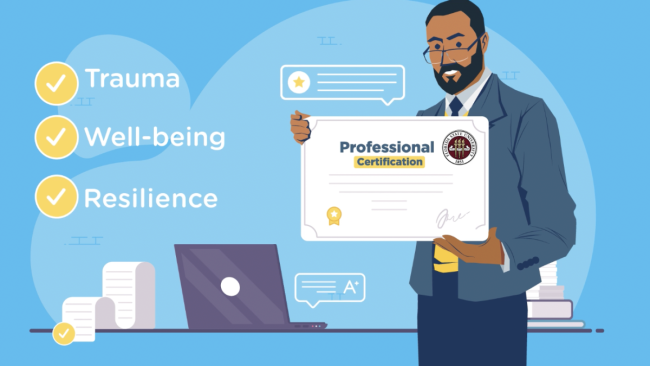You have /5 articles left.
Sign up for a free account or log in.

Florida State University
Supporting student success is complex goal. “Every student faces different challenges: first-generation dynamics, lack of resources, debt, housing and transportation, disability, mental health issues, social and pandemic-related issues, even neurodiversity,” says Karen Oehme, director of Florida State University’s Institute for Family Violence Studies, which developed a 20-hour online certification on college student well-being, trauma and resilience that some 2,000 higher education professionals have completed to date.
There are “many, many projects, units, strategies and resources being designed in every corner of higher ed to try to deal with these challenges. Our work on resilience is just one part of the issue, but it’s connected to everything,” Oehme adds.
The course, launched in 2021, aims to help faculty, staff and administrators reach their students and provide supports in new ways. Besides an overview on student well-being, trauma and related challenges, content covers:
- COVID-19’s effect on student well-being
- Effects of trauma on student well-being and resilience
- Applying trauma-informed principles to an institution
- Diverse and inclusive campus cultures and resilience
- Resilience tools for young adults
- Compassion fatigue and vicarious trauma
Oehme, formerly the steering committee chair of the national Academic Resilience Consortium, notes that as higher ed professionals try to keep up with students’ multifaceted needs, they’re “often also struggling, and they themselves need confirmation that they are not alone. They also need coping skills.”
Meeting Professionals’ Needs
Faculty, staff and administrators from within Florida and beyond have taken the course. According to information from the program, average participant ratings are 4.4 of 5 on overall satisfaction, 4.5 on quality and 4.2 on the likelihood of recommending the course to others.
Defining Student Success
While student success is often thought of in terms of retention and completion rates, both student success and student wellness should be thought of as long-term concepts, Oehme says. “Student success ultimately equals a sturdier workforce,” she says. “Student success should be viewed ultimately as healthier individuals, families and communities that can face tremendous challenges and bounce back from adversity.”
Being resilient “is a process that involves supportive partners who understand students from their emotional, mental, physical, financial and, yes, spiritual spaces,” says Doria K. Stitts of Winston-Salem State University, who plans to have her staff take the course. Such an understanding “helps students cope with those life stressors that lead them to places of despair, helplessness, anger, fear, et cetera—ultimately impacting their success in college,” adds Stitts, current chair of the resilience consortium, associate provost for undergraduate education and dean of University College at the institution.
Training programs such as FSU’s “prepare people to work through the impact of those stressors and are effective at helping others succeed.”
Winston-Salem State already employs resilience coaches, who Stitts says “work intentionally with students from unique populations that face these life stressors in countless ways.” Resilience coaches integrate academic success plans with academic and co-curricular interventions that “assist students in staying the course through goal-setting, accountability, empowerment and self-efficacy.”
The ‘Vulnerability Gap’
A study of 1,043 students at a large public university in Florida identified a significant relationship between students’ adverse childhood experiences and their self-reported resilience. Across the sample, resilience scores—an indicator of well-being—decreased as the number of adverse experiences reported increased, notes the 2020 article, co-authored by Oehme, in Florida Journal of Educational Research.
This “vulnerability gap,” or group differences in childhood trauma and resilience, is especially prevalent in certain student subgroups. Women, nonwhite students and nonheterosexual students reported significantly more adverse experiences and less resilience than male, white and heterosexual peers.
Oehme and her co-authors argue that all of this has implications that call for more trauma-informed policies.





